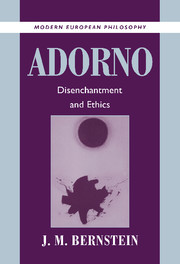Book contents
- Frontmatter
- Contents
- Preface
- List of Abbreviations
- Introduction
- 1 “Wrong Life Cannot Be Lived Rightly”
- 2 Disenchantment: The Skepticism of Enlightened Reason
- 3 The Instrumentality of Moral Reason
- 4 Mastered by Nature: Abstraction, Independence, and the Simple Concept
- 5 Interlude: Three Versions of Modernity
- 6 Disenchanting Identity: The Complex Concept
- 7 Toward an Ethic of Nonidentity
- 8 “After Auschwitz”
- 9 Ethical Modernism
- Index
2 - Disenchantment: The Skepticism of Enlightened Reason
Published online by Cambridge University Press: 05 June 2012
- Frontmatter
- Contents
- Preface
- List of Abbreviations
- Introduction
- 1 “Wrong Life Cannot Be Lived Rightly”
- 2 Disenchantment: The Skepticism of Enlightened Reason
- 3 The Instrumentality of Moral Reason
- 4 Mastered by Nature: Abstraction, Independence, and the Simple Concept
- 5 Interlude: Three Versions of Modernity
- 6 Disenchanting Identity: The Complex Concept
- 7 Toward an Ethic of Nonidentity
- 8 “After Auschwitz”
- 9 Ethical Modernism
- Index
Summary
How can we begin to comprehend what is involved in the destruction of aura? Adorno borrowed the notion of the destruction of aura from his friend, Walter Benjamin, and associated it with another and more central Benjaminian theme: the destruction of experience. In the opening section of the “The Storyteller,” Benjamin describes soldiers returning home from the First World War shell-shocked, grown silent, not richer but poorer in experience: “A generation that had gone to school on a horsedrawn streetcar now stood under the open sky in a countryside in which nothing remained unchanged but the clouds, and beneath these clouds, in a field of force of destructive torrents and explosions, was the tiny, fragile human body.” Commenting on this passage, Giorgio Agamben states:
Today, however, we know that the destruction of experience no longer necessitates a catastrophe, and that humdrum daily life in any city will suffice. For modern man's average day contains virtually nothing that can still be translated into experience … it is this non-translatability into experience that now makes everyday existence intolerable – as never before – rather than an alleged poor quality of life or its meaninglessness compared with the past (on the contrary, perhaps everyday existence has never been so replete with meaningful events). … [E]xperience has its necessary correlation not in knowledge but in authority – that is to say, the power of words and narration; and no one now seems to wield sufficient authority to guarantee that truth of an experience, and if they do, it does not in the least occur to them that their own authority has its roots in an experience.
- Type
- Chapter
- Information
- AdornoDisenchantment and Ethics, pp. 75 - 135Publisher: Cambridge University PressPrint publication year: 2001

